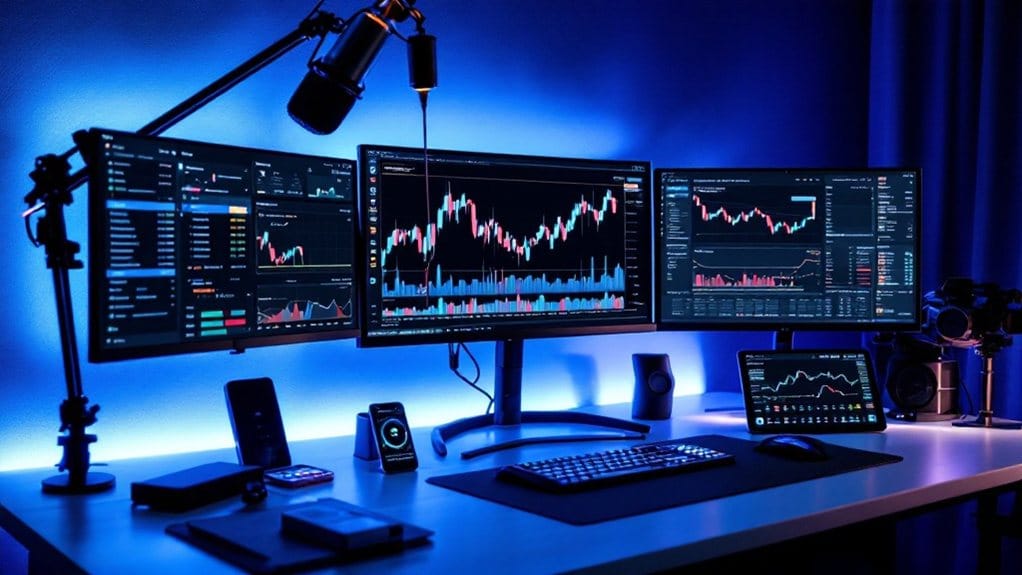Leading cryptocurrency resources include digital platforms like Coindesk and CoinTelegraph for market analysis, while established exchanges such as Binance.US and Coinbase provide technical education through their learning portals. Reddit communities facilitate peer discussions, and structured courses from the Blockchain Council offer thorough guides on trading fundamentals. Educational content spans DeFi protocols, mining operations, and regulatory compliance, with experts recommending an 80% focus on foundational knowledge. The cryptocurrency ecosystem holds deeper insights for those ready to investigate its complexities.

The ever-expanding cryptocurrency landscape has created an extensive network of resources, tools, and platforms that crypto enthusiasts can utilize for informed decision-making and market participation. Digital platforms like Coindesk and CoinTelegraph serve as primary sources for breaking news, market analysis, and technological developments in the crypto space, while notable figures such as Andreas Antonopoulos provide expert commentary through social media channels. Experts emphasize spending 8 out of 10 hours on foundational knowledge before exploring advanced trading concepts. Due to significant price fluctuations in early 2025, investors should focus on resources that emphasize risk management strategies.
Cryptocurrency’s digital ecosystem empowers investors with diverse resources and expert insights, enabling strategic market engagement through reliable information channels.
For trading activities, established exchanges including Kraken, Binance.US, and Coinbase offer varying degrees of cryptocurrency access, with each platform maintaining distinct advantages regarding security features, fee structures, and available trading pairs. These platforms are complemented by analytical tools like TradingView, which enables traders to conduct technical analysis through advanced charting capabilities and market indicators.
The emergence of decentralized finance has introduced additional learning requirements, with platforms like Solana and Cardano developing sophisticated ecosystems that demand understanding of smart contracts and blockchain fundamentals. Educational resources from the Blockchain Council and similar organizations help bridge the knowledge gap through structured courses and certification programs, particularly valuable for those exploring DeFi protocols like Aave and Compound.
Regulatory compliance has become increasingly important for crypto participants, necessitating reliable sources for legal updates and tax guidance across different jurisdictions. This includes staying informed about anti-money laundering requirements and evolving cryptocurrency regulations in major markets like the United States and China.
The mining segment of the cryptocurrency industry presents its own set of educational needs, with resources focusing on hardware selection, security protocols, and operational efficiency. Enthusiasts can access detailed comparisons of mining equipment, from consumer-grade GPUs to specialized ASIC miners, while simultaneously learning about vital security measures to protect digital assets. The process of mining serves as a crucial validation method where miners solve cryptographic puzzles to secure the network and prevent double-spending.
Communities on Reddit, particularly r/CryptoCurrency and r/Bitcoin, provide valuable peer discussions and real-time market insights, creating an interactive environment for knowledge sharing and trend analysis.
FAQs
What Are the Best Hardware Wallets for Storing Multiple Cryptocurrencies?
Leading hardware wallets for multi-cryptocurrency storage include Ledger Nano X, supporting over 1,800 cryptocurrencies with Bluetooth connectivity, and Trezor Model T, featuring a touchscreen interface and open-source security.
SafePal S1 offers extensive blockchain support with air-gapped technology, while Tangem provides NFC-based solutions for mobile integration.
These devices prioritize cold storage security through offline private key management, robust encryption protocols, and backup recovery systems.
How Can I Protect My Crypto Investments From Potential Exchange Hacks?
Investors can protect their cryptocurrency holdings through multiple security layers:
- Store majority of assets in hardware wallets (cold storage)
- Enable two-factor authentication on exchange accounts
- Use unique, complex passwords for each platform
- Keep minimal amounts on exchanges for trading
- Implement multi-signature wallets where possible
- Regularly monitor account activity
- Verify exchange security protocols and insurance policies
- Maintain updated security software on access devices
Which Tax Software Is Most Reliable for Reporting Cryptocurrency Trades?
CoinTracker emerges as the most reliable cryptocurrency tax reporting solution, serving over 1 million users with direct integration to major tax platforms like TurboTax and H&R Block.
The software supports 500+ exchanges and wallets, providing extensive tax loss harvesting tools and automated calculations.
Its official partnerships with leading platforms, combined with accurate transaction tracking and detailed reporting capabilities, make it particularly suitable for both retail and professional crypto traders.
Are Crypto Trading Bots Worth Using for Automated Investment Strategies?
Crypto trading bots can be worthwhile investments when properly configured, offering 24/7 market coverage and emotional-free trading with success rates up to 82%.
However, their effectiveness depends on market conditions, strategy optimization, and security measures.
While advanced bots can process millions of data points per moment and execute trades within 0.01 moments, users should combine automated capabilities with human oversight and implement robust risk management features.
What Security Measures Should I Take When Participating in ICOS?
When participating in ICOs, investors should implement multi-layered security measures, including using hardware wallets for storage, enabling two-factor authentication, and verifying project legitimacy through thorough research.
Smart contract audits, regulatory compliance checks, and verification of team credentials are crucial steps before investment.
Furthermore, investors must protect their private keys, use secure networks, and remain vigilant against phishing attempts targeting ICO participants.









